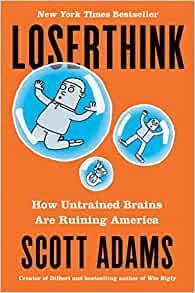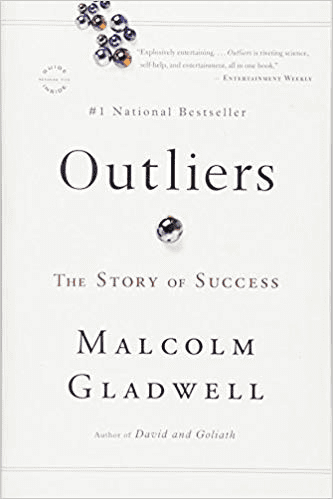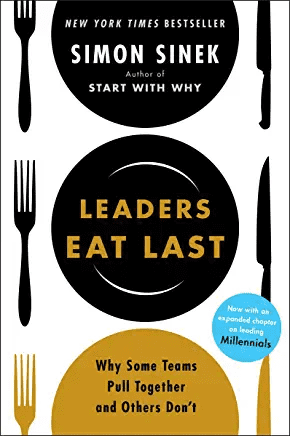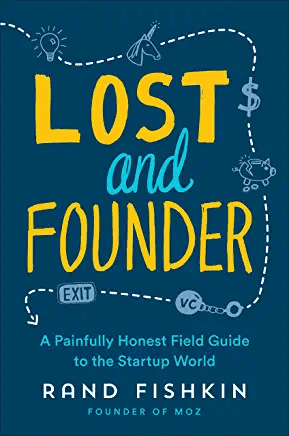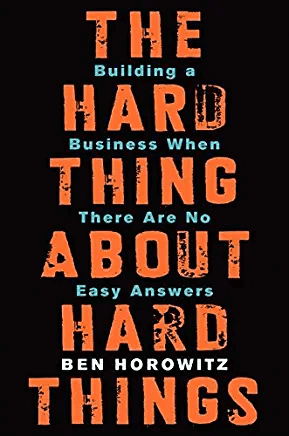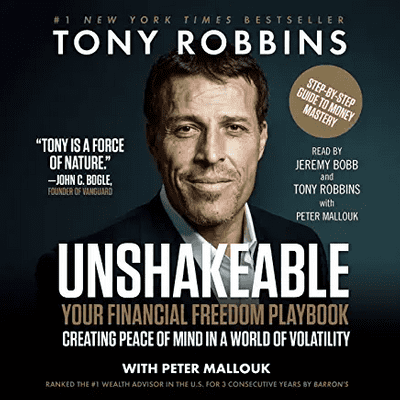6 Books That Will Change the Way You Think
February 20, 2020
I want to preface this post by saying I'm not gonna be talking about the stereotypical books that everybody needs to read like:
Yes those books are great - you should go read those books. I consider them a prereq for the books I’m about to lay out to you.
Instead of slamming those same books over your head, I want to go through some of the books that I've read in the past few years that have impacted me in deep and meaningful ways. The first book that I want to get into is called
Loserthink by Scott Adams.
Now let me just say Scott Adams is a total ********. He is very pretentious and writes this book from the perspective he is better than you and he spends a lot of time talking down to you as the reader.
In spite of all that, it's actually a really great book that teaches you how to avoid wasting time thinking about things that really just don't matter. Thinking about things like:
- “Oh I wonder if climate change is real”
- “I wonder if the economic policy passed by world leaders is appropriate for the growing trend of globalization”
- etc.
The point is - you can't really do much about it; you're not an expert in that field so don't waste your time worrying about it. He also talks about how you need to quit judging people based on what you think they're thinking. You can't read minds so there's no point in thinking that you know what other people are thinking.
I've caught myself doing that plenty of times where I'm thinking - “Oh this person on Twitter meant this when he said something else; he’s insinuating it!”
Overall - really great book for those looking to free yourself of the mental prison of judgement and time wasting. He wrote it for anybody and everybody to read; it's not just a business or entrepreneurship book. It's a really good book if you want to learn how to think like a productive human being.
Now this next book on my list is probably the most popular book I have on my list and it's also one of my favorites and that is
Outliers by Malcolm Gladwell.
He really goes into detail about what makes successful people and how there's so many different aspects of it. It's not just one event; it is so many different things that influence your future.
This book really helped me by showing me that everything is connected. I think more about the 1st, 2nd, and 3rd order consequences of actions I take on a daily basis.
Some of the examples that he gives in the book are incredibly interesting… E.g. If you're born in a certain month your percentage rate of going to college or graduating college drops significantly.
It is interesting to see certain things that you don't have control over when you're born and how those can play into the overall outcome of your success. Gladwell also talks about things that are in your control that you can change.
It's very much a ‘create your own luck’ kind of thing but it's not exactly luck - it's just cause and effect. For example if you take one action then there's a percentage chance that this outcome will happen. You start thinking about these things more - at least I did after I read this book.
All of the little things throughout the day add up because it's not just one action or one defining moment that determines your success forever, it's like the accumulation of little actions that you take every single day.
People always talk about taking “massive action”, but in reality it is the tiny actions throughout the day that push you towards success. It isn’t just big huge steps; it's small little steps forward.
This book concreted that idea in my head that every day I need to be doing something to progress myself forward. I need to be creating opportunities for myself; I need to be manipulating luck - because it's not about luck, it's about putting yourself intentionally in situations that are going to give you the best result and help you move forward.
So again this is probably one of my favorite books I've ever read. Highly recommend.
Up next is
Leaders Eat Last by Simon Sinek.
Sinek has spent a significant amount of time studying successful people. In particular execs in bigger companies and in leadership roles, and thus his viewpoint on leadership I take very seriously and find very valuable.
In particular in this book (because he's written a lot of different books), he talks about how just because you're a leader or just because you're in charge doesn't mean that you get all of the resources. Just because you’re ‘making all this money’ doesn’t mean it’s all yours. As a leader - if you're in charge of something - you're eating last.
What that means is - and I'll use an example here because it's it's a literal example as well as a figurative example - if you are apart of a tribe or even in a wolf pack, the alpha wolf is one that's in charge. He is in charge and out hunting and gathering and getting resources for the group. When they come back they don't take it all for themselves, in fact, they take very little. They take whatever is left.
Being in charge of a group means you have to feed that group because without the group there is no leader.
Simon really talks a lot about the mindset of a leader and the angle that you have to take in order to be a successful leader. Even if you are self-employed and don't plan to ever hire anybody, you're still leaving a job (where you had a leader/boss) to be your own boss, and you need to understand what it means to be a good leader even if you're working by yourself. If you're self-employed, you're still your own leader - or rather you're leaderless, thus you need to understand the mindset of what it means to be a good leader.
So this next book is kind of under wraps - I feel like quite a hipster for having read this book because I haven't ever heard anybody else talk about it. I would have never even found this book but my business partner recommended it to me. I don't even know how he found it, but it's a really great book and it's called
Lost and Founder by Rand Fishkin.
Now if you don't know who Mr. Rand Fishkin is - you're not alone. He's pretty unknown I believe, but he is the founder of Moz. If you do anything with search engine optimization (SEO), you probably have heard of Moz. Rand started that company and this book is all about - well, the subtitle to the book is “a painfully honest field guide to the startup world.”
And that is an accurate subtitle. The reason I really enjoy this book is because he goes into the details of his failures and I think that that is super, super important because anybody can talk about how successful they are even if they're not. But quite few people talk about all of the bad things that have happened to them along their journey.
This is indeed a painfully honest field guide, so he goes into a lot of deep details about all of the bad things that have happened as he's building his company. One of my favorite parts was when he was talking about how he had an offer to sell his company for millions and millions of dollars and he denied it. Years later it's one of his biggest regrets.
He regrets hugely not selling his business when he could have how that haunts him to this day. So this book has helped me (obviously) avoid the same mistakes that he made, but it's also helped me see the path that you need to take in order to become successful and have a successful business. Fishkin talks about how you don't need to take venture capital, in fact, he doesn't recommend you do - because he did and that was another mistake that he regrets.
Overall It's just nice to see all the different things that he did wrong so that I can learn from them. Heh. Speaking of showcasing all of your failures the next book I want to talk about is
The Hard Thing About Hard Things by Ben Horowitz.
I love this book because (like Fishkin) he goes into all of the really deep and painful details of being a CEO and running a company. It's not all gumdrops and rainbows, in fact, there's very few gumdrops or rainbows on the road to building a successful company. Horowitz talks about how he had to lay off a ton of people, and these were good, hard-working, people - some of them he had been friends with for years.
They were great people, but he couldn't afford to pay them anymore so he had to lay them all off. These are the realities that happen when you run a company - sometimes you have to let people go because you can't afford to pay them. Maybe your company is not doing too well right now or maybe the new product you launched was a flop. It’s hard either way.
Ben talks plentify about the hard things about hard things and the toll that it takes on your mental health. How he came out on the other side just crazed and insane because of all the difficult challenges that he's had to go through.
This book has helped me know that building a business is not a straightforward path. There is no ‘step-by-step guide.’ I feel like that is what many people are obsessed with nowadays. “Show me the step by step guide” they ask, but the thing is there is no step by step guide.
You can learn about the techniques and the strategies of people that have come before you used to become successful, and that might lay the groundwork for you to build your own business, but it won’t guide you all the way to where you want to go. Because - well - everyone has different destinations.
I was pretty lost with my business (I didn't have a step-by-step guide) and I was trying to find solutions, but I was so unsure of the decisions I was making at the time. I was just frozen.
This book really helped me be comfortable with the fact that most of the time - I don't know what I'm doing. At least half the time I'm unsure with the decisions that I make.
And the thing is - that's okay. You don't have to know everything about everything in order to start a business or be successful. Starting anything new is a learning experience for everybody and even though you may not know anything about what you're doing, you can still take a step forward.
Just like in Outliers - it's just one little step every day; not some big massive action. You just have to take small steps forward. Though you may not know if those steps are the right steps to take, that's okay. As long as you accept the fact you might not know where you're going, you can still move forward and eventually you'll figure it out. You see a certain step was bad; now you know and can try a new direction.
After reading this book I truly understand that no one really knows what they're doing and everybody's just figuring it out as they go along. There is no playbook. There is no secret formula. There is no step-by-step process. Everyone just bumbles along until they figure it out.
That being said you can find people that will help you along the way, and I'm very thankful for the people and mentors I've had in my life that have given me pointers or tips. Obviously I'm incredibly thankful for all these books that I'm talking about in this video as well. These books have influenced me an immeasurable amount. If you want to talk ROI - it’s like 20 bucks or less and I can't even add up the dividends I’ve been paid on this information.
Anyway I'd really recommend The Hard Thing About Hard Things if you're unsure about where you're at. Just know - it’s okay to be unsure!
The very last book I want to talk about is a book called
Unshakable by Tony Robbins.
Now I'm not a huge Tony Robbins fan. I've never really watched a lot of his content or seen his videos. I know he's very inspirational, loud, and screaming at people, and I'm not a fan of that as you probably know.
But this book is actually a really amazing guide to build and maintain wealth. I know that I said earlier that there is no step-by-step secret formula but when it comes to actually planning out your financial life (as in investing your money) this is a really great guide on how to go about doing that.
One of my favorite parts of this book is on page 43. He talks about a 20 year span of the stock market and then he says if you're invested every single day you get an 8% yearly return. This is normal and what we hear all the time. Everyone talks about how the S&P returns 7 or 8 percent a year.
That’s great and dandy except what no one talks about is that if you missed the top 30 days of trading, your return is actually 0% per year. In fact, if you miss the top 40 days of trading, you LOSE 2% a year.
That averages out to only a day or two per year over a 20 year span of time. As long as you stay invested and you don't pull your money out you actually end up making a lot more. The issue is if you pull your money out or you try to time the market.
If you try to be predictive - if you try to make speculation calls - you can end up losing a lot again. Again this is a 20 year period and he looks at just the top 30 days of trading. You want to make sure that you stay invested.
This book showed me the ins and outs of investing in the stock market - in particular he talks about investing in the S&P 500. Most of my portfolio is made up of the S&P 500, and I don't ever pull my money out because this book showed me the math behind it.
Robbins also goes into detail on how you need to start investing early. If you invest throughout your 20s you can actually stop investing at 30 and you'll end up having more money when you retire than someone who started investing at 30 and then invested every year until they retire. I thought I knew the power of compound interest before this book, but WOW. This book really hammered it home for me because I guess I didn't fully grasp its potential.
Also the bit about how you need to just stay in your investments and not pull your money out just because you think the market is gonna go down. You need to live through the downturns so that you can enjoy the upturns. If you miss out on those upturns (they only happen one or two days a year on average), you'll actually lose out on a ton of money. You’ll go from 8% per year to 0% or even lose several percent.
I hope you enjoyed this post. Go read another one and I’ll see you there!
Written by Jordan Kilburn A.K.A. the Millionaire Millennial who lives in Dallas and helps people enjoy life, make money, and build cool stuff. You should follow him on Instagram / YouTube

